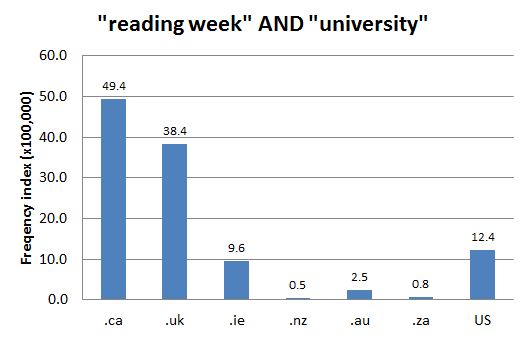DCHP-2
reading week DCHP-2 (July 2016)
n. — Education
A week-long break halfway through the semester at post-secondary institutions, usually the fall semester.
Type: 2. Preservation — In Canada, reading week is generally in February or March. In the US, this period is often called spring break. As the second 2015 quotation shows, some universities in Canada are moving to hold a reading week in the fall term in addition to the traditional spring-semester week with no scheduled classes.
The term is also used in the UK (see Chart 1) but rather than reading week applying to the whole institution, it generally applies only to certain courses or departments. As the name indicates, the break was intended to allow students to focus on reading, research and study, although students now often use the break for recreation rather than reading. The original 19th-century (UK) idea was, and is, to offer time to explore texts individually. For that purpose, historically, small groups of students and teachers went on retreat to study a given text in-depth. This is still the case in a (very) few UK institutions (see the Times Higher Education reference. Such travel and retreat is generally not meant by reading week at Canadian institutions, where it has come to refer to a week of vacation, almost void of its original scholarly intention and legacy.
See also ITP Nelson, s.v. "reading week", and OED-3, s.v. "reading week" (n).See also: March break
References:
- ITP Nelson
- OED-3
- Times Higher Education (2000) Article Accessed 11 Jul. 2016
Images:
Chart 1: Internet Domain Search, 5 Oct. 2012
